
Hello, Me!
I like that Hello, Me! is simple, funny, and fun all in one. One can never go wrong with Choi Kang Hee in a fantasy rom-com drama. I enjoy her narrating in her head what she wouldn't dare say out loud. It works so well. But what works more is that she's opposite Kim Young Kwang in the drama; I had forgotten how tall he is. He plays the spoiled, bratty 30-year-old who's never worked a day in his life rather well. The drama is off to a fun start. Despite reading the synopsis, I hadn't realized Ji Seung Hyun would have a part in this drama; what a pleasant surprise. However, I did know Eum Moon Suk would, and boy, am I loving him and his knack for the grandiose; it suits him perfectly. He had me smiling from ear to ear. And how about Jang Ki Yong and Lee Soo Hyuk's cameo, and in the first episode, nonetheless. That was a treat.Was this review helpful to you?
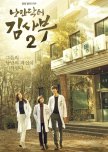
Was this review helpful to you?
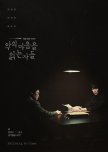
Through The Darkness Comes Light
I loved that this drama focused on the profiling techniques to identify and help capture vicious criminals, and the heavy weight and darkness the profilers carry with them. Kim Nam Gil had me deep in my emotions. I can hardly imagine how it must be to live day in and day out with the viciousness of the crimes we've witnessed in this show in real life -- the secondary stress, compassion fatigue, burnout, post-traumatic stress, and everything else in between. As someone once said, the expectation that one can be immersed in suffering and loss daily and not be touched by it is as unrealistic as expecting to walk through water and not get wet. Ha Young reaching that burnout point and wanting to escape the darkness is only natural, but wanting and actually being able are two completely different things. Kim Nam Gil and this drama make all the other current dramas pale by comparison.Just like how I enjoyed the depth Kim Nam Gil brings to his role as Song Ha Young. I loved the passion Kim So Jin brings to Tae Goo. A top-notch police officer disregarded her for her gender. The more I watched Through the Darkness, the more respect I gained for Kwon Il Yong as the first ever South Korean criminal profiler, and for pouring his all into looking inside the hearts of monstrous criminals at the time when the term criminal profiling and the idea of serial killers was nonexistent. And what I like more is that the drama focuses more on those who chase serial killers, rather than the serial killers themselves. I liked that the drama was unapologetic in its realistic depiction of the events at that time, the overt contempt and ingrained prejudices of male police officers at all levels towards their female counterparts even more than I did the serial killings, and I abhorred those. I understand the behavior is reflective of the times, and despite it having gotten somewhat better, the sad truth is that the battle between feminism and deep-seated misogyny continues to this day and is perpetuated by historical practices. I love that this drama doesn't shy away, nor skims through the dark issues.
What affected me most as I watched the events of this drama unfold is how Kook Young Soo, Yoon Tae Goo, Jung Woo Joo, Reporter Choi Yoon Ji, and particularly Song Ha Young struggled to come to terms with the senseless abuses and murders each case and interview brought to the forefront. I would be remiss not to mention Kim Nam Gil's brilliance in the role of a man and police officer who feels too much, so much so that he distances himself from everyone as a way to cope. There were many scenes that touched me deeply, and in particular the scenes where the team desperately searched for a murdered child's missing fingers. When Ha Young wishes in his sleep, he could've puffed her killer away before he committed the most atrocious act against. What I like most about Ha Young is that he doesn't fit nor does he try to fit. And the more I watched the drama, the more I realize that serial deviant behavior flows from a hard heart. One choice leads to many, many choices until the conscience is so hardened that the predators forget they even have one. and no longer in operation.
When one is fully immersed in a show 12 episodes seem so short. The end came a lot faster than I expected or wanted, and just when I started to get used to Ha Young's smiling face. I loved the rapport and camaraderie Song Ha Young, Kook Young Soo, and Jung Woo Joo persistently built together, helping each other through what may have seemed like endless darkness. They went from being marginalized for their grandiose ideas to becoming the most sought after criminal profilers. My biggest takeaway from this drama is that through the darkness comes light, through fear comes love, and through pain comes triumph, as someone once said. No doubt Kim Nam Gil, Jin Seon Kyu, Kim So Jin, Ryeoun and the many other brilliant and talented actors made it seem a lot simpler and sexier than in real life -- the true heroes are the likes of Kwon Il-yong, who encountered evil time and time again and persevered through it all. Kim Nam Gil in The Fiery Priest was awe-inspiring, so much so that I thought he wouldn't be able to top that role, but I was wrong. He did again, and I am sure he will do it again and again. A thousand and one kudos to those who penned, directed, and brought this profound drama to life -- a job beyond well done. Kim Nam Gil definitely leaves a void, and I pray this is not the end, but the beginning of many seasons to come.
Was this review helpful to you?

This review may contain spoilers
Unexpectedly Delightfully
I am a huge Kim Ok Bin fan. The first time I saw her was in The Villainess, and she was brilliant -- a true villainess. And I have since enjoyed her in everything she's done, especially Children of the Lesser God. I have seen her master all kinds of roles, from an assassin to a future foreseeing police officer, to playing Tan Ya in the Arthdal Chronicles series, to a zombie-fighting detective. She is perfect in all of them, and what I love most is that she always plays a strong, badass female lead. Having read the premise of this drama, I wasn't sure if the role of Yeo Mi Ran would suit her, but I needn't have worried. She plays her so naturally that it is almost hard to separate the actor from the character.Yeo Mi Ran is similar to many other female roles Kim Ok Bin has played in many ways. She is tenacious, headstrong, and righteous and does not let any man walk all over her or get too close. She is a lawyer, and by all accounts a very good one, but in her personal life is a true philanderess, never faithful to one man, and it goes back to her home life more than anything until she meets Nam Kang Ho (Yoo Teo), a famous actor in South Korea due to his handsome appearance, intelligence, and kindness. He is sought after to work in romantic movies but doesn't trust women, and he cringes at the mere thought of their touch to the extent that it leads to severe panic attacks controlled only by subscription medication.
Love to Hate You is a romance drama about a woman who detests male chauvinists and meets a borderline misogynist with a prejudice against women who at first hate each other, but as they slowly get to know each other, they are drawn to each other. Before they know it, they fall in love. And in many ways, their difference brings them together to make them the perfect couple. In a way, it's the typical hate-to-love drama, with a twist of a contractual relationship that leads to a full-blown romance. But what's different about Love to Hate You is that it intelligently handles sexism and prejudices against women, whether in the workplace, at home, or in relationships, and how society disguises it as culture or tradition, making it socially acceptable to keep women at a lower social status than men.
But what's intriguing about Love to Hate You is that it not only addresses misogyny but also brings awareness to manizing (women who pursue multiple casual relationships with different men) and the sexual double standard of a patriarchal society that glorifies, rewards, and even praises men for their womanizing way. In contrast, women are derogated and stigmatized for similar behaviors. Love to Hate You doesn't just stop there; it also sheds light on the complex landscape of the cancel culture and how fans are crucial stakeholders in the entertainment industry. Their passion, excitement, and involvement are pivotal in making or breaking the celebrity they have a significant hand in creating. In a way, holding them accountable for their actions, but in some cases, it can be extreme.
Many celebrities deserve to be canceled, mainly if the wrongs they engage in or have engaged in the past reflect their character (sexual assaults, bullying, prostitution, sex trafficking, emotional, mental, or physical harassment, abuse in the workplace or at home, etc.). Other than that, in my opinion, who a celebrity chooses to sleep with, love, marry, spend their time with, or how they live their personal lives is their business. As such, I loved how Love to Hate You addressed Yeo Mi Ran's manizing past and how Nam Kang Ho stands up for his love and doesn't give in to the pressures of his agency or fans. I hope some celebrities similarly and unfairly impacted by the cancel culture could learn a few things from Nam Kang Ho.
It would be a real mistake to assume that Love to Hate You is just another rom-com; it's far from it. Yes, it has some silly and funny moments, but it also has some profound moments that refreshingly push the boundaries in K-drama to question ridiculous, if somewhat offensive acceptable social norms; this elevates the show from your typical, expected rom-com to delightfully unexpected. Aside from the powerful message it sends, Love to Hate You brings some beautiful visuals in actor Kim Ji Hoon as Do Won Joon Nam Kang Ho's agent, protector, and friend; Go Won Hee as Shin Na Eun as Yeo Mi Ran best friend and fierce protector; Lee Joo Bin as Oh Se Na Nam Kang Ho's first love and many others who did a fabulous job portraying their different characters. Highly recommend it.
Was this review helpful to you?

A Seemingly Fun Drama Addressing Family Pressure on South Korean Kids to Succeed Academically
My take on this drama now that we are almost to the midpoint.I love, love watching Jeon Do Yeon. She is a natural and has this way about her, making me believe her in every role she takes. Here she is funny, fun, and almost over-indulged as a mom trying to keep up with other moms way over-involved, if not obsessed with their children's education. I adore Jung Kyung Ho; he is such an expressive actor and so much fun to watch. He is my third favorite South Korean Actor. I have to admit I wasn't sure what to expect from him in this role, but I love this fun side of him, and his love and dedication to math and teaching make me want to go back to school and re-do all those math exams I took as a senior in high school -- who knew math could be so appealing.
The twist I didn't expect from this drama is the murder/crime/suicide aspect. It makes sense to have that twist, seeing how much pressure parents, schools, and the education system puts on these kids. I am all for pushing your kids to excel in school, but it shouldn't be at the expense of their mental health or life, for that matter. One of the biggest tragedies of the Korean education system is that children and teenagers must always study. They have little time left over for fun, relaxing, vacations, or enriching themselves in non-school-related activities. It's not forced on them, but they are given few options for success; if they do not excel, it's as good as forced on them. Some kids study 18 hours a day, spend 10 hours at school, go to cram-school classes after school, and spend their time studying at home to secure a good college and standard of living, and acceptance is beyond tragic. I wish the parents, especially the moms, would put as much time into providing their children with a more balanced life as they do with their education. It would amount to a much happier society with students/children who aren't as stressed or pressured to study all the time and wouldn't need to cheat, lie, scheme, or bully to be accepted, feel good about themselves, or stay ahead.
Not only Koreans but most Asians see education as a way of gaining success and bringing esteem to one's family. And what's even more bewildering is the extent these mothers would go to secure that success for their children even at the expense of other children, resorting to cheating, lying, and scheming -- which in turn leads to bullying others and harming others and themselves, even murder and suicide. I don't even know if a solution exists. Still, I think the system itself needs a massive overhaul, and so does the role of the family and education-crazy mothers who believe their child's life is not about freedom, personal choice, or happiness; it is about production, performance, and obedience -- life is so much more than that and just because one birth a child it doesn't mean then own them.
I appreciate this drama for bringing up the many issues related to the education system in South Korea, particularly the pressure families put on their kids to succeed academically and the consequences of those actions.
Was this review helpful to you?

The Beautiful and the Sexy
I loved the transitionally yet commendable growth in Su Yeol through his alter ego K. The best part of them was that even in their splitness, they remained an extension, rather than two separate entities fighting to dominate one another. Everyone needs a heroic figure who, in spite of weaknesses, and not always knowing the right answers, helps them overcome life's adversities, and maybe even even help them recover a piece of their humanity that they may have lost along the journey of life. And K is exactly that for Su Yeol. I enjoyed every aspect of the Bad and Crazy, it solidified my admiration for Lee Dong Wook as an actor and not just a beautiful face, while at the same time introducing me to a different side of an amazingly brilliant talent that is Wi Ha Joon. Additionally, I enjoyed the many talents we met while on this journey, but the two that stood out the most are Kim Hi Eo Ra as Boss Yong and Won Hyun Joon as Andrei Kang, her henchman. I am forever a fan. I will miss this fun drama, but look forward to seeing Lee Dong Wook and Wi Ha Joon in their upcoming projects later this year.Was this review helpful to you?
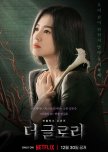
This review may contain spoilers
Revenge is indeed best served very cold
The Glory; what a drama. I am not much of a Song Hye Kyo fan. But was this drama well written or what; I mean, not a boring moment. The first episode was rough, and I have to admit I skipped through a lot of torture and violence. It was just overt and too much to reconcile or bear. That, the world harbors kids (I mean they were children really) who felt so entitled and thought the world revolved around them, that it gave them the right to inflict such animosity and hate on another child just because they are different, or was is it "just because" they felt like it was uncalled for, inexcusable and shame on everyone that stood by and watched and did nothing, they as good as inflicted the violence and pain but more than anything shame on the teachers, the parents, the caretakers, the friends or so-called friends, well there was no love lost between any of them so I can't even call them friends who thought it entertaining and okay to humiliate, demean, deface, another human being.By the time we got to Moon Dong Eun as an adult, I was fully invested in her journey. Everything from how she lived her life in narration to Park Yeon Jin (stellar acting) was so captivating. I found myself hanging on to every word she wrote, even the way she spoke/wrote her words. That first encounter after 17 years at the gym of their old school was so fulfilling, especially when she clapped for Yeon Jin as she walked up the stage for her award. But the best part was Yeon Jin thinking the past was fully forgotten and dead in the past. That she could not even recall her monstrous acts made her an even more awful human being than she already was -- that she didn't realize the decisions and choices she made would follow her to her grave is very telling of her arrogance and malignant miserliness. Her audacity to think MDE deserved everything that happened to her, not only that she in some way is to blame, was exhausting to watch. That her young child, not even 5 or 6 years of age, instinctively knew how awful burning someone or beating them or torturing them was and she an adult never even considered it was telling for me. It was the moment I realized Yeon Jin deserves everything coming her way -- everyone involved or who stood idly is also deserving.
It was not all gloom and darkness with The Glory; many funny moments peppered in throughout the episodes. I especially enjoyed the, at first, very professional relationship between Kang Hyun Nam and MDE, and even more so as they started to warm up. Yeom Hye Ran did a great job making me feel the pull/push relationship and the slow drawing in of MDE, and even the love and admiration between the two. And, of course, Lee Do Hyun was consistently excellent in how he personified Joo Yeo Jung; how he grew to accept and live with his painful past, despite it being part of him daily. His patience and acceptance of MDE for what she was, not trying to make her into what he thought she should be -- never pushing or probing, just hoping. I loved how he didn't judge or question when she told him her story, but readily accepted his role as her head swordsman.
I would be remiss if I didn't mention how amazing Jung Ji So was as a teenage Moon Dong Eun. She is such a great talent; I am in awe of her. Can I say Jung Sung II was brilliant in his role as a have-it-all rich husband, father, and man -- he was admirable - not too entitled or arrogant, just a man used to getting his way, not by force, but because it was always available. Unlike the inherently entitled, self-absorbed, and cruel Jeon Jae Joon (Park Sung Hoon, who was brilliant in his role), who obviously lived his life believing the world owed him everything, but then growing without love or self-worth, can do that to a kid.
What's intriguing about The Glory is that it takes its time with everything. Nothing is rushed, not even the conversations. So it went without saying that the revenge plot would take its time, almost painfully so. But I think that was the point; for the culprits to know, sense, and feel the revenge coming, but not know how, when, where, and through whom it would come.
Watching the Glory was like peeling back the layers of a big fat onion; the more you reveal, the twisted it gets. Kudos to the writer for such brilliant scriptwriting, the director, and the actors for gripping the writing alive. I look forward to the second half and the actual revenge plots unfolding.
Was this review helpful to you?
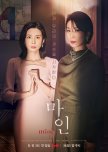
Love is a Learned Behavior
When I first started watching this drama, I wondered why the title "Mine," pretty soon it became clear why; despite all its riches, nothing this family owns is truly their own, not even themselves. More than Mine's premise, what drew me to it was an article I read where the writer Baek Mi Kyung explained why she cast the two female leads in their respective roles. She said that “As a writer, the fact that I’m able to work with the unfailingly talented actresses Lee Bo Young and Kim Seo Hyung is an honor in and of itself." “Because they’re actresses who are powerful in terms of both their acting and their auras, I think the script was even more empowered after they were cast. Also, they’re so well-suited to their roles that they leave nothing to be desired in terms of matching up with their characters. I think of [their casting] as a blessing.” True to the last word.Many elements made this show, everything from the high-end production design, the set, the beautiful outfits and styles, and even the OST, sets the tempo and brings character to the drama, Kim Seo Hyung, though elevates Mine with her performance. She thoroughly embodies the layered character of Seo Hyun so brilliantly that without her, Mine wouldn't be as good as it has become. And the same goes for Ok Ja Yeon in the role of Kang Ja Kyung / Lee Hye Jin, who was thrilling to watch in The Uncanny Counter but even more so in this drama. I loved how this show depicted women - fearless, kind, compassionate, capable of giving and receiving love, but most importantly, admitting to one's mistakes. As they say, never underestimate the power of a kind woman; kindness is a choice that comes from incredible strength. There is nothing more thrilling than strong wounded women steadfastly facing their demons and winning, even if it's just the beginning of the fight.
Mine was a great drama to the end; kudos to the screenwriter, director, and actors for bringing this fantastic story to life. However, as sad as I was to see it come to an end as appreciative of the important message it left behind in that one can ever truly own anything if they don't own themselves first, and to love others, one must first love themself. And that just as love is a learned behavior, if one never learns how to receive it, they will never know how to give it back.
Mine could've been a multitude of stores, but I liked that rather than be a story about sexual minorities, it was a story about love and finding one's true self in themself. And what elevated it to the status of brilliant was the way the drama portrayed Jung Seo Hyun and Seo Hee Soo’s relationship not as sisters-in-law fueled by jealousy or hierarchy but as sisters who find themselves stuck in a world filled with hatred but learn through it all to care and protect each other to the end deeply. Brilliant drama! I enjoyed and relished all the actors who did a great job making me believe them each in their own way but Kim Seo Hyung the most.
Was this review helpful to you?
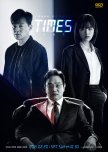
Present vs. Past -- good first outing
I like Times' concept of a reporter with a president for a father. For as long as I can remember, people have said politics has no relation to morals. Still, I think Seo Jung In's father ( Kim Yeong Cheol) may have been the last honest politician. But that's not all that Times' about; it's more about the desperate need of a daughter played by Lee Joo Young to save her father's life, which leads to the uncovering truths that shake her and the country. In that sense, I completely understand why, when presented with the opportunity to turn back time, save her father, and reveal the truth, she jumped at it regardless of time and space. Who among us given that opportunity wouldn't take it.There's always a reverence to watching time-crossing/travel dramas; if not done right, they can be downright confusing, and most of such dramas except for maybe Signal and Karios as time-crossers and Train as time-traveling have fallen in that pit. It's too early to pass judgment on Times as of yet, but I will say I was a bit confused halfway through the first episode as it wasn't clear to me whether the female lead was suddenly transported to the future or if the first half was a flashback from the past. That said, I liked Times' first outing, and I am interested in seeing how Lee Seo Jin plays into things but more so how the show will work the time-crossing element compared to the dramas I noted.
Was this review helpful to you?
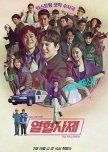
Kim Nam Gil should be enough to make one want to watch anything he's in -- Fiery indeed!
The Fiery Priest is everything from action to comedy to suspense and thrills. Nothing about this drama is wrong, from the acting (Kim Nam Gil and all other actors) to the writing to the directing and the fight scenes just fantastic. I've been following Kim Nam Gil for quite a while now. Not only is he a talented actor but a great person. I've enjoyed him starting from his "When Spring Comes" days to date and loved everything about him as a catholic priest with a fiery temper and a twist. To say that he was perfect for this role and the drama is an understatement. His acting is on point, be it in the comedic moments or the sad ones. Finding out he and most of his teammates filmed all their fighting scenes themselves made me appreciate the drama even more but Kim Nam Gil even more. He made me swoon more than I already do, something I didn't think possible. He more than deserved the award he received as best actor for the drama.To that, credit must be given where due. The storyline, script, character development, and backstories were so well done. The comedic moments were so good I couldn't stop laughing, and I especially loved all the church scenes and characters with Father Kim leading the fray to affect the change he wanted not just for his district but the nation. As great as Kim Nam Gil was in his role, he couldn't have done it without his other leads in Kim Sung Kyun, Lee Ha Nui, Go Joon (he melts me every time he is on screen), Geum Sae Rok. And the support he received from Jeon Sung Woo, Ahn Chang Hwan, Baek Ji Won (Sister Sarah) I have to say I couldn't get enough of her and Eum Moon Suk in his role as Jang Ryong, what unique talents they all are-- I was in awe of them.
There's nothing I didn't like about this series; I even loved the OSTs. I was thrilled to know there may be a second season and patiently, or should I say impatiently await its release, either way, I'm beyond psyched for it and Kim Nam Gil for reprising his role as Father Kim.
Was this review helpful to you?

Was this review helpful to you?

Amazing Drama
I watched this on Netflix, and I was obsessed; I loved it until the very last three or so episodes, hated the ending, that said still worth the watch. What stands out about The Rise of the Phoenixes is atmosphere and attention to period detail – it's a big, complex, grown-up story, rich in culture and period flourish, delivered by a talented creative team and performed by an exuberant cast. Military Academy Headmaster Xin Ziyan (Zhao Lixin), Prince Ning Yi (Chen Kun), and Feng Zhiwei (Ni Ni) were amazing. And sleeper star (Hai Yitian), he was brilliant in every way, does an excellent job showing the Crown Prince as the weak weasel he was.It was twisted and complicated yet very well acted, directed, intellectually written by far one of the most beautiful dramas. I enjoyed the character development throughout the 60+ episodes and the lengths to which the prince went to protect the ones he loved and, of course, to get his revenge was extremely enjoyable. I am not much of a Chinese drama watcher as they tend to be quite long, especially the historical ones, but this one was great, and the music just amazing. I highly recommend, despite not being a fan of the crazy ending or how the romance or what there was of it got so tangled and convoluted, but I guess that's what made it very real.
Was this review helpful to you?
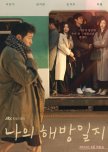
Liberating and Worship Worthy
My Liberation Notes is a drama that resonated with me in many ways. Just watching it made me feel like I, too, am being liberated, and I wasn't even half as deep as where the characters were, if at all. But then, who can't relate to the struggles of fading youth, wanting to love and be loved, managing mounting responsibilities to the extent of losing the will for idle talk, and the unavoidable frustrations and challenges of daily lives when even living itself is burdensome, not many.I loved how the story handled itself, and the message that liberation is realizing the voices in our heads aren't who we are, and only when we see that can we indeed be free. I felt liberated by how this drama depicted human relations, giving me the sense to appreciate the people in my life and opening me up to accept those to come in the future, something my old self before My Liberation Notes wouldn't have done. Every relationship in this drama mattered no matter how small, which made it so special.
I loved how real this drama was in expressing real people's thoughts and actions; how it addressed the fact that some people put others down, not because they are evil or rotten human beings, but because sometimes it's the only way they know how to feel better about themselves. And that sometimes all a person needs is the knowledge that someone cares to make a difference.
More than any other drama, My Liberation Notes made me realize how blessed I was in my life rather than the life I think I should've had. I would not have had that without going on this fantastic, silent yet deeply touching and meaningful journey with Gu, Mi Jung, Ki Jung, Chang Hee, Tae Hun, and everyone else who was part of this story, whether in a prominent or supporting role. There were many touching and emotional moments in this drama, but the Yeom children gathered for their father's birthday, and him finally opening up to them is one of the best. The geninue moments between Gu and Mi Jung, Ki Jung her boss and Tae Hun, Chang Hee at work and with his friends -- all of the little nuisances in the storytelling made this drama one of the best if not the best of 2022. A thousand and one kudos to the writer who excelled at making me feel and live each step of this drama's journey. The director for bringing it all to life, and the actors for quietly yet forcefully imparting to me the message that life is what we make it, always has been, and always will be; we just need to believe that. I felt worshiped just watching this drama.
I will miss My Liberation Notes. As much as I already enjoyed Lee Min-Ki and Son Seok Koo's acting skills in other projects, their natural way of depicting their roles in this one made me realize how talented they are, and the same goes for Kim Ji Won, Lee El, Lee Ki Woo, Chun Ho Jin and the rest of the cast. Next to My Mister and Lost My Liberation Notes will remain with me for a long time to come for silently making me hear the things I unconsciously and sometimes consciously ignored. Ignore what you may have heard or read about this drama; watch it you will never be disappointed; on the contrary, you may learn something about yourself you didn't know before.
Was this review helpful to you?
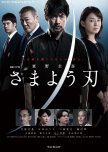
This review may contain spoilers
Raw and Heart wrenching as it Should Be
To give an introduction to this, astutely eye-opening six episode drama, Higashino Keigo Samayou Yaiba is adapted from the 2009 Japanese movie, The Hovering Blade (Samayou Yaiba), about a father played by Terao Akira, who, after finding out the identities of his only daughter's murderers, avenges her horrific death, and the police who try to stop him. The 2021 drama version, Takenouchi Yutaka, plays Nagamine Shigeki, an architect who raises his daughter Nagamine Ema (Kawai Yuumi) on his own after his wife's passing. Ema is now a high school student with a part-time job. One day, she is called out to work the late night shift and does not return. The next day, she is found dead.Samayou Yaiba's opening scene of a father and daughter sweetly teasing each other belies the harrowing scenes of three teenage boys parked in front of a metro station, sizing up females as they walked down the street akin to ambush predators laying in wait to trap and capture the perfect prey. One got the feeling that they had definitely done this before, and unfortunately for Nagamine Ema, who was at the wrong place at the right time, to the sudden and overwhelming pouncing attack by Kaiji and Atsuya, while a third boy Mokota (Inoue Mizuki) stood powerlessly watching, paralyzed by his fear of the scene that unfolded in front of him, feeling weak, vulnerable and defeated, while helping subdue Ema. Not to excuse his behavior, but from the little I glimpsed of him, I got the sense that he was being bullied by Atsuya and Kaiji, forced to do all kinds of things he didn't want to, but doing them nonetheless, to survive himself, which he was being bullied.
Words cannot describe how dreadful it was watching the vivid cruelty of humanity as Astuya and Kaiji drugged and carelessly, loudly and brutally rapped Ema, filming their horrific actions to death and discarding her like garbage while her father does everything a parent is supposed to do, helplessly searching, passing out fliers, and even reporting his daughter missing the police to help find her. All the while not knowing the evil, ill fate that had befallen his daughter. My heart ripped for him and the sorrow that awaited him, and especially that moment he had to identify her at the morgue. Shigeki's despair at his daughter's loss was so palatable, and what an amazing job Ichikawa Riku does to have me as the audience feel his loss.
Violent acts are always choices that individuals make. Yet, it is the people who are harmed by violent acts that often receive negative responses from the police, as well as from various social institutions. I know it is the police's job to suspect everyone, even the victim and family members, and Samayou Yaiba does a great job of showcasing the prevalent issue of victim blaming. Even Mokota is prey of it to some extent by his unrelenting abusers. But worse than all that was how the law in Japan viewed juvenile delinquents who committed serious crimes versus how they viewed the victims and their families. Prior to November 2000, the Japanese Juvenile Law affirmed that juveniles under twenty will not have their cases transferred to the Public Prosecutor to impose criminal disposition. Even those who possess criminal capacity must be treated with protective measures in principle, and punished criminally only in some exceptional cases.
Even though the revised Juvenile Law, passed in November 2000, partially modified the system. The revision included three points: partially expanding the range of possible punishments of juveniles; adjusting the fact-finding process in Family Court; and protecting the victims of juvenile crimes. So it is with this in mind that I understood the police's apprehension of discussing the crime, or even eluding to the fact that a minor or minors may have committed the crime without clear cut evidence. But I also empathized with Shigeki completely, for rightfully thinking only those who've experienced loss, the way he did, could fully understand him. The scenes where he explodes at the police station, and later when he discovered his daughters' last moments, had me in goosebumps. Everything Shigeki does after that moment, the rage he unleashes, didn't only seem justifiable, but righteous. What parent confronted with what Shigeki was wouldn't take the same course of action he did, I would imagine none.
A lot unfolds in the first episode of this drama, alone, but the real story doesn't begin until Mokota, riddled with guilt, disguises his voice, calls Shigeki, and names Atsuya and Kaiji as the killers, gives him the address to the apartment where the murder took place, and tells him where to find the key. There, Shigeki discovers his daughter's clothing and pictures, as well as the video detailing Ema's brutal rape and her final moments as she lay dying while Atsuya and Kaiji laughed their heads off. And at that moment, Atsuya returns home to Shigeki's attacks. Unable to contain his anger, he mercilessly stabs Atsuya, who doesn't show any remorse, but only after he tells him where to find Kaiji, and the rest is history as they say.
Same as the movie Higashino Keigo Samayou Yaiba, the drama depicts a father's journey to avenge his daughter's brutal murder by two careless thrill seeking teenage boys, Atsuya (Namura Shin) and Kaiji (Ichikawa Riku), and the varying opinions of the public and media about the validity of his quest for revenge, including the Tokyo policemen investigating his case, and an inn-keeper and his daughter where he takes refuge as he tracks down the main culprit who instigated and actively participated in the murder of his daughter. I personally think that no one can genuinely say or even think what they would do if placed in Shigeki shoes and that is what makes this drama so raw, so real, and so gut-wrenching.
Was this review helpful to you?

And we saw time and time again Nam stay persistent and determined not only to make the Dreams into a winning team but one that valued the person standing next to them as there is no “I” in “team”. I struggled to understand PF's analogy in not taking Nam on as the general manager (if you haven't watched this drama you will understand what I mean once you do) but took it for what it was – a negotiating compromise to a winning situation – a happy home for the Dreams. It was good to see the CEO despite their (his and Nam's) differences finally have the courage to stand up to his uncle and realize he is nothing without his ideals and in the process gained a friend. Love that the episode was light and fun mingled with a bit of sadness but goodbyes are always sad.
I loved this show, the writer, director, cast, Kang Du Ki (my hero) and Nam, always Nam for showing us week in and week out that patience and insistence have a magical effect before which difficulties disappear and obstacles vanish. That’s what dreams are made of, persistence and determination. With that in mind, I resolve to keep my dream of a season 2 alive, the ending surely left it open to interpretation.
Was this review helpful to you?

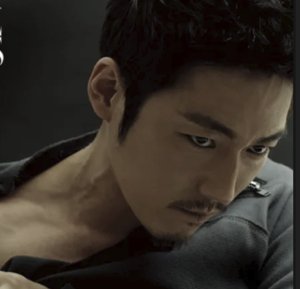
 2
2





















